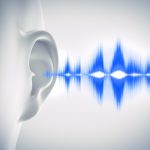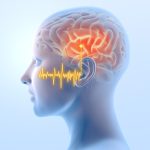Growing evidence is supporting the belief that “hidden hearing loss”, a type of inner ear nerve damage, may contribute to tinnitus, a potentially debilitating hearing condition.
The discovery of hidden hearing loss, a type of cochlear nerve degeneration, at Mass Eye and Ear forever changed the way medical professionals think about the inner workings of the ear. It has also provided new clues about what may trigger tinnitus: a condition in which a person may hear persistent sounds, such as ringing, inside their head.
The condition has no known cause, which means clinicians can only recommend ways for the millions of people diagnosed with the condition to manage their symptoms, as opposed to administering a cure.
In 2017, four Mass Eye and Ear researchers in the Eaton-Peabody Laboratories were awarded a five-year $12.5 million P50 grant from the National Institutes of Health to better understand the prevalence of hidden hearing loss in patients without any measurable signs of hearing loss on conventional tests. Since then, one of those researchers, Stéphane Maison, PhD, AuD, CCC-A, a Mass Eye and Ear audiologist and associate professor of Otolaryngology–Head and Neck Surgery at Harvard Medical School, believes there is now enough scientific premise to suggest hidden hearing loss could play a role in triggering tinnitus, as well as other hearing conditions, such as hyperacusis and difficulty understanding speech in noisy environments.
Dr. Maison explained to Focus how hidden hearing loss could contribute to tinnitus, and how evidence of a link between the two could lead to a potential cure.
Tinnitus and underlying hearing loss
According to Dr. Maison, an estimated 10-to-15 percent of adults experience tinnitus. The condition is commonly described as hearing sounds inside one or both ears, or elsewhere inside the head. These sounds may manifest as ringing, buzzing, whooshing, roaring, pulsing or other noises. Beyond the nuisance these sounds cause, tinnitus symptoms can cause sleep deprivation, social isolation, anxiety and depression in some patients.
When explaining tinnitus to patients, Dr. Maison likes to use the analogy of an amputated leg. If a person loses a leg in a car crash, they may still sense the limb’s presence and report feeling a terrible pain where their leg used to be – a phenomenon known as “phantom limb pain.” This pain, he said, is the brain’s way of coping with the sudden loss of signal from the leg.
Dr. Maison believes a similar phenomenon could explain tinnitus. Except, instead of the brain coping with a missing leg, it is responding to a loss of hearing signals in the ear. The brain then sends itself its own auditory input to cope with the hearing loss, resulting in sounds heard from inside the head. Some experts in the field criticized this comparison at first; many patients with tinnitus had no evidence of hearing loss on an audiogram, which is widely considered the gold-standard of hearing exams.
Audiograms provide information about the health of sensory cells in the inner ear called hair cells, which convert sound into electrical signals. It was believed that deterioration of these cells was the primary cause of hearing loss; nerve loss was considered only a secondary cause.
This understanding changed in 2009 when M. Charles Liberman, PhD, and Sharon Kujawa, PhD, at Mass Eye and Ear, uncovered hidden hearing loss. Together, the researchers showed that nerve damage, in fact, precedes hair cell loss as a result of aging or noise exposure. Since this type of neural damage is not detectable on an audiogram, the 2009 discovery forced experts to reconsider the original missing-limb analogy.
“The leg had been amputated, after all,” Dr. Maison said. “Just not in plain sight.”
Increased understanding of hearing loss
Hair cells and auditory nerve fibers support hearing in different ways. Hair cells provide the audibility of sounds, like speech, entering the inner ear. These cells act almost like a miniature volume dial; they determine how loud noises sound. Sound clarity, however, depends in part on the auditory nerve and the central auditory system.
Upon receiving a sound, hair cells pass electrical signals to the nerve, which then passes those signals to the brain. How well the auditory nerve relays these signals contributes to the clarity, or intelligibility, of these sounds. Multiple connections existing between the hair cells and the nerve help determine the strength of those signals. If some of these connections break down, so will the strength of the signals reaching the brain, which will make it difficult for a person to discern one sound from another.
Inside a restaurant, for example, a person with healthy hearing can follow a conversation despite the music playing overhead and the chatter of customers. However, once the synapses between the hair cells and the auditory nerve break down, that same person might find it impossible to zero-in on a conversation happening at his or her table.
The discovery of hidden hearing loss revealed that noise exposure and aging destroyed the synapses before it could destroy hair cells in mice. Although more evidence is needed to support Dr. Maison’s suspicions, the destruction of synapses could explain why the brain might overcompensate for a lack of signals arriving from the inner ear, thereby causing tinnitus.
Could tinnitus ever be treated?
Right now, there is no cure for hidden hearing loss or tinnitus.
Hearing aids can amplify speech perception and significantly help with communication. However, difficulty following conversations in noisy environments remains a primary complaint of hearing aid users.
Restoring the synapses between hair cells and the auditory nerve could improve speech clarity. At Mass Eye and Ear, new drug therapeutics called neurotrophins have proven successful in restoring synapses in animal models. However, the effectiveness of these drugs in humans remains unknown. Since the standard audiogram is not well versed in determining the health of the auditory nerve, there is still a need to determine which patients have hidden hearing loss before any experimental drug can reach a clinical trial.
Through his research, Dr. Maison aims to identify biomarkers of neural degeneration that can be associated with speech-in-noise difficulties and tinnitus. His research will help identify candidates and track the efficacy of emerging treatments meant to provide better speech intelligibility outcomes to hearing aid users, shed a new light on strategies to silence tinnitus and reduce the physiological activity leading to hyperacusis.
“If we can definitively prove that hidden hearing loss triggers tinnitus and other maladaptive plasticity processes in the central auditory pathway, then repairing the connections between the nerve and the cells of the inner ear may lead to a reduced perception of tinnitus,” he said. “We’re no longer talking about learning how to deal with tinnitus or using a treatment aimed at masking the ringing in your ears. We’re talking about a possible cure.”
Read more about Dr. Maison’s research in The New York Times and watch his interview with WWLP Mass Appeal.




I have a hard time believing that only ten to fifteen percent of the population have tinnitus being that many do not report the problem and decide to live with it.
Please continue full speed ahead to find a cure,thank you
Please continue quickly with your research. I’m sure you know how stressful and depressing tinnitus is.
My prayer is for peace and quiet everyday. Thank you.
I would love to know if and when there’s a need for volunteers who want to be part of any kind of study. This Tinnitus is driving me crazy some days and I’m tired of asking people to repeat what they’ve just said. Hearing aids just made everything louder, but not easier to understand. Thanks for investigating this problem and good luck going forward!
My husband is desperate for some help. The ringing is out of control. He needs help somewhere, but no one can help
I woke up a few months back with complete hearing loss. But now have tinnitus in both ears. Please help us live a normal life. Suffering with this is awful.